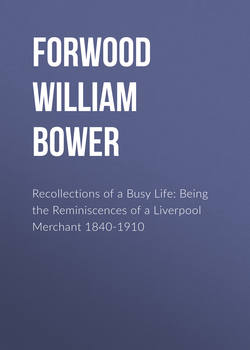Читать книгу Recollections of a Busy Life: Being the Reminiscences of a Liverpool Merchant 1840-1910 - Forwood William Bower - Страница 10
CHAPTER III.
LIVERPOOL
Commerce
ОглавлениеIn the 'sixties, sailing-ships filled the Liverpool docks, and fully one-half of them flew the American flag. The great trades of Liverpool were those carried on with America, Australia, Calcutta, and the West Coast. The clipper ships belonging to James Baines and Co., and H. T. Wilson and Co., were renowned for their fast passages to Melbourne, while the East India and West Coast ships of James Beazley and Co., Imrie and Tomlinson, McDiarmid and Greenshields, and the Brocklebanks were justly celebrated for their smartness and sea-going qualities. Charles MacIver ruled over the destinies of the Cunard Company, and this line then paid one-third of the Liverpool dock dues. Mr. MacIver was a man of resolute purpose, and a power in Liverpool; in the early volunteer days he raised a regiment of field artillery, 1,000 strong, which he commanded. Many stories are told of his stern love of discipline. A captain of one of the Mediterranean steamers asked his permission as a special favour to be allowed to take his wife a voyage with him. Mr. MacIver whilst granting the request, remarked that it was contrary to the regulations of the Cunard Company. The captain, upon proceeding to join his ship with his wife, to his surprise found another captain in command, and a letter from Mr. MacIver enclosing a return passenger ticket for himself and his wife. William Inman was building up the fortunes of the Inman Line, and was the first to study and profit by the Irish emigration trade. The Bibbys and James Moss and Co. practically controlled the Mediterranean trade. The "tramp" steamer was then unknown, and outside the main lines of steamers there were few vessels; but the Allans were forcing their way to the front, and Mr. Ismay was establishing the White Star Line, which revolutionised Atlantic travel. Mr. Alfred Holt was doing pioneer work in the West India trade, with some small steamers with single engines. These he sold and went into the China trade, in which he has built up a great concern.
The Harrisons were sailing ship owners, but they had also a line of small steamers trading to Charente. They afterwards started steamers to the Brazils and to Calcutta. Looking back, they appear to have been most unsuitable vessels, but freights were high, and to Messrs. T. and J. Harrison belongs the credit of quickly finding out the most suitable steamer for long voyages, and always keeping their fleets well up to date.
We must not forget to mention the merchants of Liverpool, for in those days the business of a merchant was very different from that of to-day. He had to take long and far-sighted views, as there was no such thing as hedging or covering by a sale of futures; his business required enterprise and the exercise of care and good judgment. Among our most active merchants we had T. and J. Brocklebank; Finlay, Campbell and Co.; Baring Brothers; Brown, Shipley and Co.; Malcolmson and Co.; Charles Saunders; Sandbach, Tinne and Co.; Wm. Moon and Co.; Ogilvy, Gillanders and Co.; T. and W. Earle and Co.; J. K. Gilliat; J. H. Schroeder and Co.; Rankin, Gilmour and Co., and others.
In the 'sixties Liverpool had two great trades. The entrepôt trade, the produce of the world, centred in Liverpool, and was from thence distributed to the various ports on the continent. The opening of the Suez Canal, and the establishment of foreign lines of steamers, have largely destroyed this trade, and produce now finds its way direct to Genoa, Antwerp, and Hamburg. The other great trade was in American produce. For this Liverpool offered the largest and best market. This trade is unfortunately seriously threatened. The increase in the population of America is now making large demands upon her productions, and reducing the quantities available for export.
Liverpool was also a considerable manufacturing centre. It was the principal place for rice-milling and sugar-refining, while shipbuilding and the making of locomotives and marine engines contributed largely to her prosperity.
One cannot review the past trade of Liverpool and its present economic surroundings, without feeling some anxiety for the future. Not only have the trades which so long made Liverpool their headquarters been to some extent diverted, but the efforts of rival ports (in many cases railway ports or ports which have little or no concern as to the payment of interest on the money employed in their construction) are directed to the capture of our trade; in this they are still being actively assisted by the railway companies, who grant to them preferential rates of carriage. There can be little doubt that our merchants and shipowners will find new avenues for their enterprise, and new trades will take the place of those partially lost; but Liverpool has in front of her a fight to obtain the just advantage of her geographical position, and it is a fight in which the city must bear its part.
The city will also have to adopt a more enlightened policy, and encourage manufacturing industries. This can only be done by reductions in the city rates, and also in the charges for water. The loss would only be nominal; we should be recouped by an increased volume of trade, and by our people obtaining steady occupation instead of the present casual employment.
